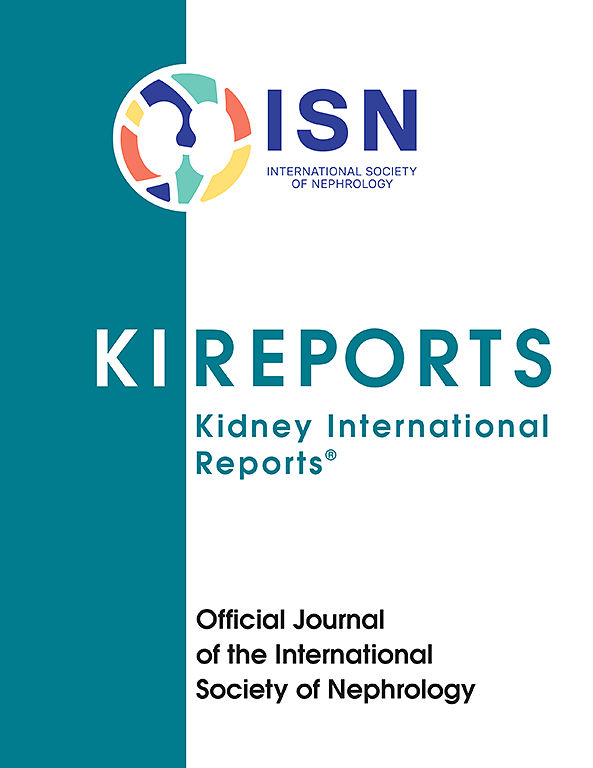铁对慢性肾病患者心血管、肾脏和安全性影响的系统评价
IF 5.7
2区 医学
Q1 UROLOGY & NEPHROLOGY
引用次数: 0
摘要
心力衰竭和慢性肾脏疾病(CKD)密切相关,铁缺乏在这两种疾病中都非常普遍。然而,主要的心血管和肾脏病指南对铁的使用提出了不同的建议。我们评估了铁与常规治疗或安慰剂对慢性肾病患者临床结果的影响。方法:我们对CKD患者静脉注射或口服铁的随机试验进行了系统回顾和荟萃分析(PROSPERO CRD42023453468)。我们检索了Medline、Embase和Cochrane Register,从数据库建立到2024年2月1日,以确定符合条件的试验。我们确定了总体结果,并使用随机效应模型对需要透析和非透析的CKD进行分层,并使用分级推荐评估、发展和评估方法评估证据的确定性。主要综合终点是因心力衰竭或心血管死亡而住院。结果我们确定了45项符合纳入标准的试验。与常规治疗或安慰剂相比,铁降低了主要复合终点的风险(1659个事件;风险比[RR]: 0.84, 95%可信区间[CI]: 0.75 ~ 0.94;中度确定性),在需要CKD的透析和非透析患者中效果一致(p异质性= 0.70)。对主要终点的影响似乎是由心力衰竭住院治疗的两个组成部分驱动的(RR: 0.77;95% ci: 0.61-0.96;中度确定性)和心血管死亡(RR: 0.81;95% ci: 0.65-1.02;低确定性)。与常规治疗或安慰剂相比,铁治疗组的严重不良事件发生率较低(RR: 0.90, 95% CI: 0.82-0.98;温和的确定性;p异质性= 0.09)。结论铁治疗可降低CKD患者心衰和心血管死亡的风险。需要随机试验来评估铁对临床结果的影响,特别是对伴有或不伴有贫血的非透析CKD患者。本文章由计算机程序翻译,如有差异,请以英文原文为准。

Systematic Review of the Effects of Iron on Cardiovascular, Kidney, and Safety Outcomes in Patients With CKD
Introduction
Heart failure and chronic kidney disease (CKD) are closely associated, and iron deficiency is highly prevalent in both conditions. However, major cardiovascular and nephrology guidelines offer contrasting recommendations for iron use. We evaluated the effects of iron versus usual care or placebo on the clinical outcomes in patients with CKD.
Methods
We conducted a systematic review and meta-analysis of randomized trials on i.v. or oral iron in patients with CKD (PROSPERO CRD42023453468). We searched Medline, Embase, and the Cochrane Register from database inception until February 1, 2024 to identify eligible trials. We determined the overall results and stratified them by dialysis- and nondialysis-requiring CKD using random effects models, with certainty of evidence assessed using the Grading of Recommendations Assessment, Development, and Evaluation approach. The primary composite endpoint was hospitalization for heart failure or cardiovascular death.
Results
We identified 45 trials that met the inclusion criteria. Compared with usual care or placebo, iron reduced the risk of the primary composite endpoint (1659 events; risk ratio [RR]: 0.84, 95% confidence interval [CI]: 0.75–0.94; moderate certainty), an effect consistent across dialysis and nondialysis requiring CKD (P-heterogeneity = 0.70). The effect on the primary endpoint appeared driven by both components of hospitalization for heart failure (RR: 0.77; 95% CI: 0.61–0.96; moderate certainty) and cardiovascular death (RR: 0.81; 95% CI: 0.65–1.02; low certainty). The incidence of serious adverse events was lower for iron compared with usual care or placebo (RR: 0.90, 95% CI: 0.82–0.98; moderate certainty; P-heterogeneity = 0.09).
Conclusion
Iron therapy may reduce the risk of heart failure and cardiovascular death in patients with CKD. Randomized trials evaluating the effects of iron on clinical outcomes are needed, especially in nondialysis patients with CKD with or without anemia.
求助全文
通过发布文献求助,成功后即可免费获取论文全文。
去求助
来源期刊

Kidney International Reports
Medicine-Nephrology
CiteScore
7.70
自引率
3.30%
发文量
1578
审稿时长
8 weeks
期刊介绍:
Kidney International Reports, an official journal of the International Society of Nephrology, is a peer-reviewed, open access journal devoted to the publication of leading research and developments related to kidney disease. With the primary aim of contributing to improved care of patients with kidney disease, the journal will publish original clinical and select translational articles and educational content related to the pathogenesis, evaluation and management of acute and chronic kidney disease, end stage renal disease (including transplantation), acid-base, fluid and electrolyte disturbances and hypertension. Of particular interest are submissions related to clinical trials, epidemiology, systematic reviews (including meta-analyses) and outcomes research. The journal will also provide a platform for wider dissemination of national and regional guidelines as well as consensus meeting reports.
 求助内容:
求助内容: 应助结果提醒方式:
应助结果提醒方式:


